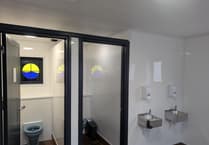Questions have been raised over the eviction of a family from their council-owned home.
The recommendation to evict the social housing tenants from the four-bedroomed flat above Dartmouth Museum was made at the town council’s corporate property committee meeting on November 15 last year, after it was proposed by committee chairman Cllr Robin Springett and seconded by Cllr Richard Cooke, the then mayor.
With members of the public and press excluded for confidentiality reasons, councillors discussed the possibility that, once the town council-owned flat was vacated, the museum could rent at least part of it for extra exhibition space.
The recommendation was approved at the full town council meeting on December 4. However, Cllr Cooke omitted at both meetings to declare his interest in the agenda item as a trustee of the museum.
At the full council meeting on July 2 this year, during part of the meeting held in private, the council voted by six to five to continue letting flat 6A Duke Street for housing – to the highest bidder.
But that decision was torn up at a specially convened meeting of the full council on July 17, due to a “procedural error”.
The council, again meeting in private, then agreed to negotiate with the museum over it renting the flat.
In September, the council told the Chronicle the error was that councillors “had not declared they were trustees of the museum, therefore rendering the decision invalid”.
If the council was to apply the same reasoning regarding declarations of interest to its November corporate property committee meeting and its December full council meeting, the decision to evict the tenants was also invalid – raising questions over the lawfulness of the eviction.
In the event, the council wrote to South Hams District Council, which had been renting the flat through its Direct Lets Scheme, on December 17, asking the district council to give the tenants three months’ notice to quit from January 1, although had the tenants seen the corporate property committee’s minutes, published on the town council’s website around the end of November, they would already have been aware of the intention to evict them.
The Chronicle has established there is only one town councillor who is also a museum trustee – Cllr Cooke. This is despite minutes of the May 1 special council meeting, under the agenda heading ‘Moving forward with flat 6A’, which was also discussed in private, recording that Cllr Gina Coles “declared an interest in this item due to being a trustee of the museum”.
Commander David Lingard, chairman of the museum trustees, has told the Chronicle that Cllr Coles is not and never has been a museum trustee.
At that special meeting, Cllr Cooke, who again omitted to declare an interest as a museum trustee, spoke about how, as trustees of the Henley Trust, with its strong ties to the museum, the council could give the museum a larger grant to cover the additional cost of renting the flat.
Chronicle archives show that the corporate property committee agreed in April 2011 to do up the flat to re-let it to a family, after the previous tenants had left.
However, in September 2011, the museum presented its case to be allowed to rent the flat and use it for extra exhibition space.
The recommendation to re-let the flat to a family was referred back to the corporate property committee by the December 2011 full council meeting for further discussion and for the then committee chairman, Cllr Debbie Morris, to arrange a meeting with museum representatives.
The council continued to discuss what to do with the flat throughout 2012 and into 2013, with councillors divided over whether to let the flat to the museum – at no cost to the council – or do it up and re-let it to a family.
Legal advice was also sought over whether there was a conflict of interest as councillors are trustees of the Henley Library and Collection, more commonly known as the Henley Trust, artefacts from which are on display in the museum.
The legal advice led to a debate at the corporate property committee meeting in January 2013 between the then town clerk, Chris Horan, and some councillors.
As the Chronicle reported at the time, Mr Horan warned councillors they would become embroiled in a “foolhardy conflict of interest” and risked bringing the council into disrepute if they pressed ahead with plans to lease the flat to the museum – a view supported by the legal advice.
Mr Horan told councillors: “While many members will be disappointed with the solicitor’s response, members need to give serious consideration regarding the contents, including his previous letter.
“Personally, I believe that there is a serious conflict of interest where the council, as landlord, will benefit from actions taken as trustees, and this could be construed as profiteering.
“In light of this, I think it would be very unwise to proceed, particularly given the legal principles laid down.”
Mr Horan said councillors could ignore the legal advice but warned: “I would advise all members against this.
“It would be extremely foolhardy and could bring the whole council into disrepute, with potentially very serious consequences.”
Prior to making a decision, Mr Horan advised councillors to ask themselves the following:
1. Would the proposal in any way result in the council, as landlord, benefitting from action taken by the council as trustees [of the Henley Trust]?
2. Could this in any way place the council in a position of conflict of interest and possible profiteering?
3. How would the public perceive this?
4. If challenged, would the council be able to justify its actions in the light of the solicitor’s advice?
Among those questioning the legal advice was Cllr Rob Lyon, the current mayor, and Cllr Paul Allen, who was mayor at the time. Current councillors at that meeting were Cllr Steve Smith and, observing, Cllrs David Gent and Cooke. The meeting was chaired by Cllr Springett, who declared a personal interest in the agenda item. He vacated the chair for that part of the meeting and committee vice chairman Cllr Lyon, then deputy mayor, took over. Councillors eventually voted to obtain further, specialist legal advice.
It is unclear whether that was in fact sought or received but in February 2013, the corporate property committee meeting recommended doing up the flat and letting it to a family. The recommendation was approved at the March full council meeting.
Yet that wasn’t the end of the matter. In April 2013, councillors were again arguing about whether to rent the flat as social housing or let it to the museum. But Cllr Francis Hawke warned: “If we change our minds, I would have to seriously consider whether I reported my own council to the Local Government Ombudsman.”
The flat was eventually renovated at a cost of more than £70,000 to taxpayers and new tenants moved in on July 23, 2014. The tenancy ended on April 22 this year and the family is believed to have relocated to the Kingsbridge area.
The Chronicle has invited the council to comment on the validity of the decision to evict the tenants and asked whether it has sought fresh legal advice on the position of councillors, as trustees of the Henley Trust, with regard to the decision to let the flat to the museum. The council had not responded to our request at the time on going to press.
Explaining its decision to evict the tenants, in June the town council said: “The town council, in co-operation with South Hams District Council, experimented with letting the flat to a family in need of housing for over three years.
“One of the conditions was that the flat, at the top of a Grade-I listed building, with a food outlet adjacent, and other tenants, would be unsuitable for tenants with animals.
“SHDC found it impossible to comply with this condition, and very real complaints about animals fouling the area above food storage and the entrance to other properties followed.
“The town council has a duty to all its tenants, furthermore, using this large flat as housing had effectively cut it off from access by members of the public, and to understand a 17th century merchant’s house, it needs to be seen as a whole. The museum and all commercially let areas are open to the public.
“With the increase in staff numbers in the council office, finding storage space has become a priority.
“Taking all these points into consideration, our agreement with SHDC was terminated and the tenant given notice.
“Flat 6A requires some renovation, and exactly where the responsibility lies is under discussion with SHDC.
“If the decision is taken to share the space in flat 6A with Dartmouth Museum, more of the Butterwalk building will be available to be visited by the public; the council has the storage space it urgently needs; and the duty of care to our other tenants will be met.”





Comments
This article has no comments yet. Be the first to leave a comment.